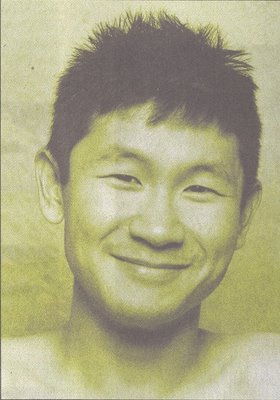Y O’Clock
faifai
Drama Centre Black Box
Thursday, May 20, 2010

The sheer inventiveness of Y O’Clock is enough to blow you away. The show presents audiences with a bewildering succession of ingenious handmade props: a tightrope, a smoke cannon in a cardboard box, a cloud made of edible marshmallow.
Japanese theatre group faifai thrusts us back into the imaginative world of childhood, engulfing us in an environment of constant play. Characters are portrayed as dolls, with actors manipulating their limbs and voices, surrounded by sets and costumes as colourful as a box of crayons.
Audiences, too, are invited to play. Before we even enter the theatre, we are given paper planes and are invited to draw on disposable plates, which will reappear later in the show, transformed into flowers.
Surprisingly, the plot isn’t truly gripping. The tale focuses on Potato, a part-time teacher at a daycare centre, played by Koji Yamazaki. He bonds with one of his charges, an eight year-old boy named Youji, and is highly disturbed when the child suddenly leaves the school to return to his orphanage.
The story is drawn from the real-life experiences of director Chiharu Shinoda, who formerly worked in a daycare centre. Its very ordinariness is to its credit: it’s a thoroughly believable story of adult alienation, taking place in a sea of childlike fantasy.
And of course, we love the fantasy. My favourite scenes are the dream sequences: actors slip into costumes to play giant mermaids, Egyptian mummies and King Kong gorrillas, terrorizing the world of the dolls.
But real life also becomes marvelously mutated in this show. At Potato’s class reunion, performer/designer Shiro Amano appears in business attire, controlling two life-size marionettes, forming a trio of identical yuppie salarymen. On another occasion, Yamazaki strips his clothes to reveal a crowd of felt tip faces drawn across his body: an array of characters to depict the chaos of a party.
And even the simplest of concepts is portrayed in the zaniest way possible. To show she needs to pee, actress Mai Nakabayashi balances a beaker on her head, while another actor fills it with a watering can.
Yet this show isn’t all bells and whistles. As a finale, the cast clears the stage in seconds, leaving a blank space where Potato encounters an adult Youji, and, with difficulty, he accepts the inevitable changes that life entails.
The two then begin a gymnastic dance, half-desperate and half-joyous. This becomes the thesis of the play: that as adults, we must not live in regret, but must celebrate the sensation of the present. This, regardless of the fact that the glorious playthings of childhood have vanished, never to return.

No comments:
Post a Comment